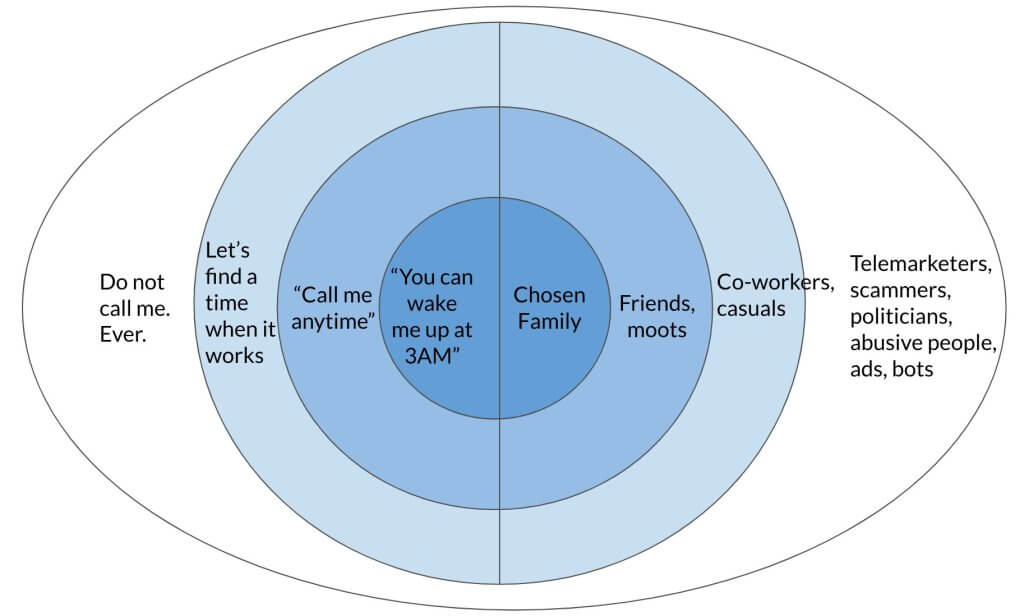In college my grandmother and I exchanged at least one letter a month. I’d share about what I was studying or my friends, and she’d tell me about her life and ideas, and we got to know each other better as adults. I treasured connecting with her in that way, and still have the letters she wrote me.
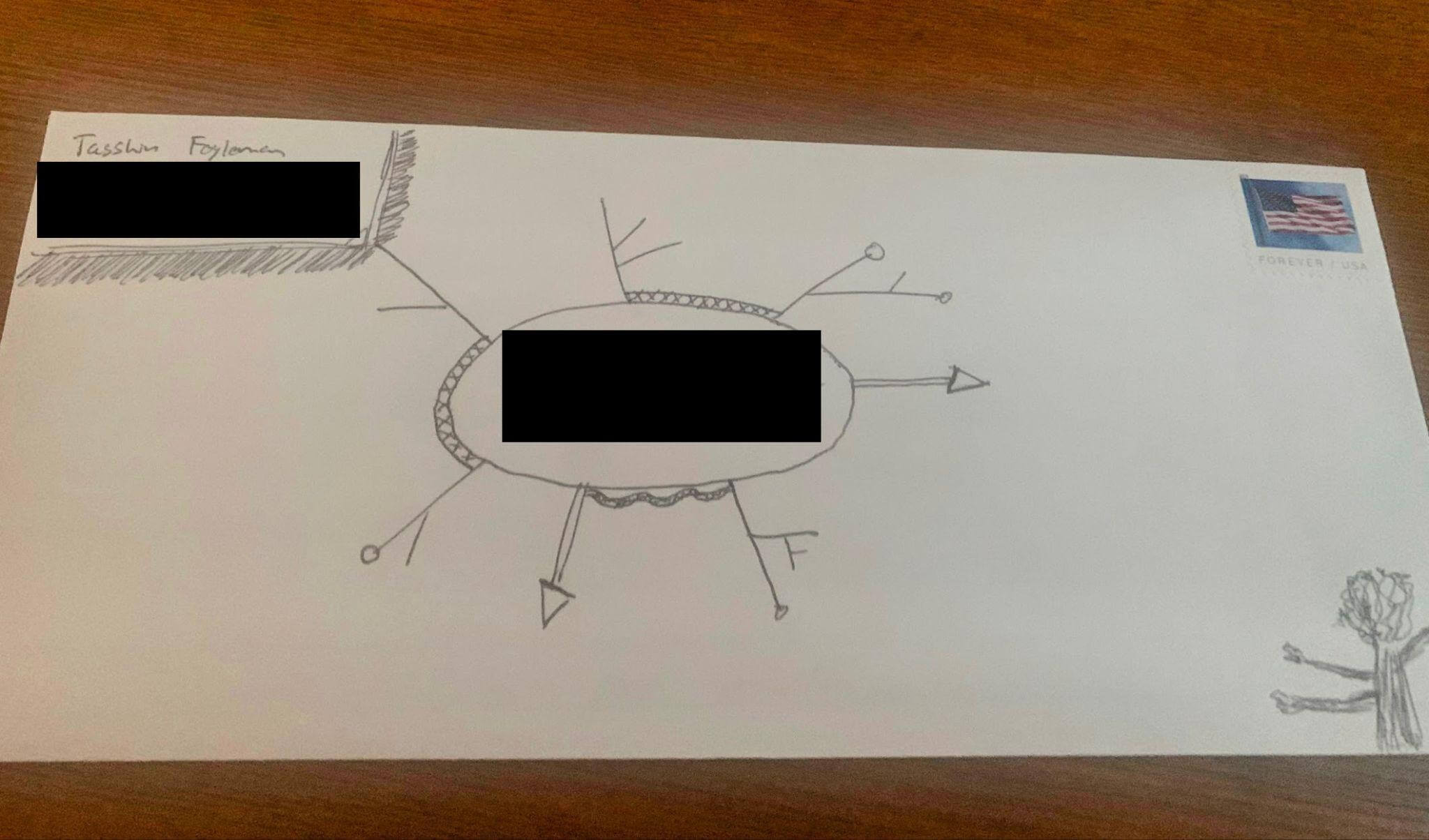
I also had an extensive email correspondence at the time. A friend recently wrote me to resurface an email I wrote him in 2011:
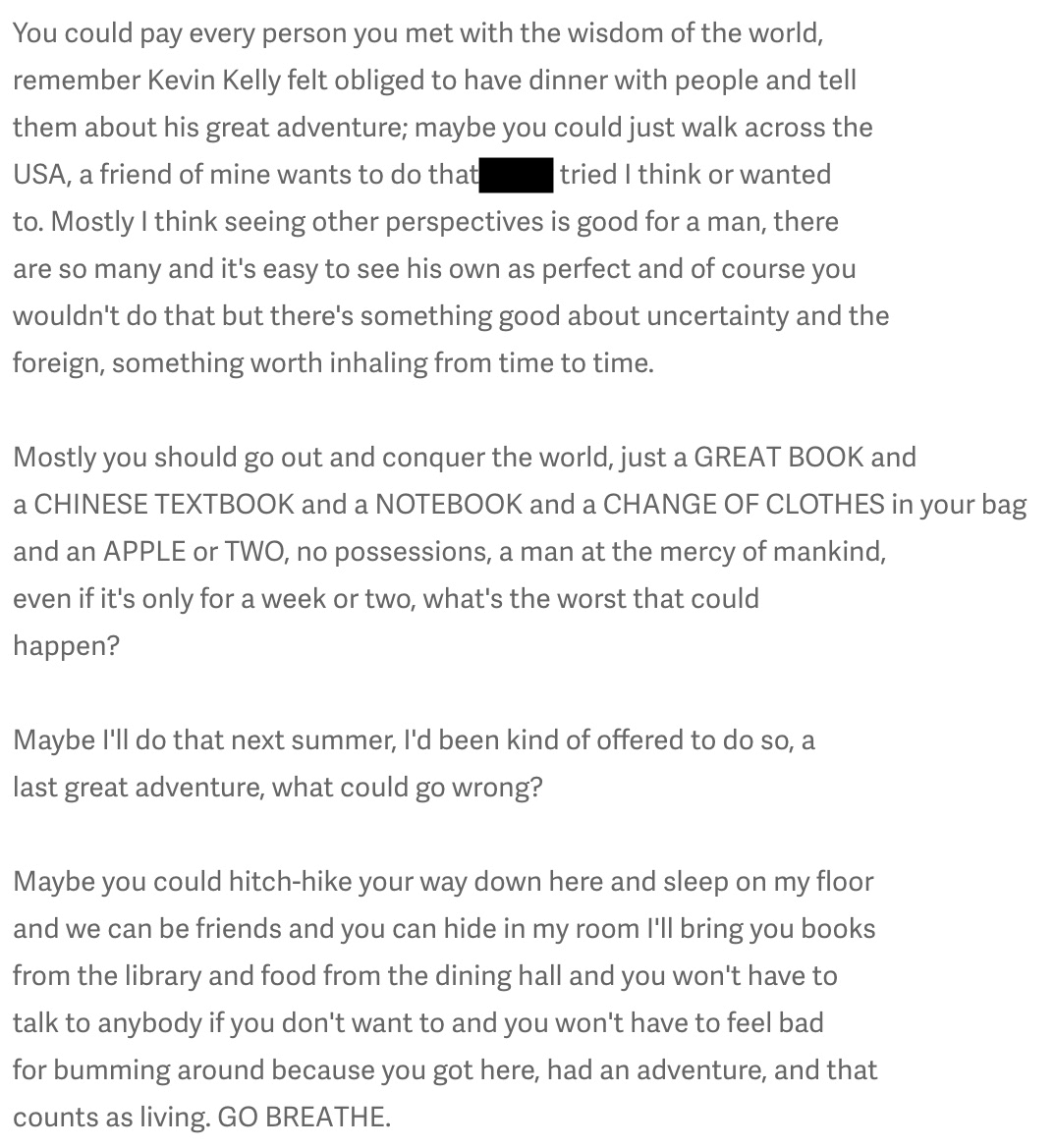
I’d completely forgotten about this era, where I wrote extremely extra emails. Honestly, I could use more of this energy in my correspondence and my life.
When we traveled in Asia together after I graduated college, my friend Ulysse (then Ben) introduced me to a software program he’d written called Keep in Touch. The idea was to keep a list of people U wanted to stay in touch with, as well as information about when U’d last contacted them. I used it regularly for a few years after that and was able to maintain friendships and connections that otherwise might have gone by the wayside.
Peace Pilgrim is one of my greatest heroes. In addition to walking tens of thousands miles spreading her message of peace, she also maintained an extensive correspondence. The editors of her book say that she “considered it part of her job to reply to all of the thousands of people who wrote to her over the years.” Her mail was one of the few things she carried with her on her pilgrimage, inside the pockets of her tunic.
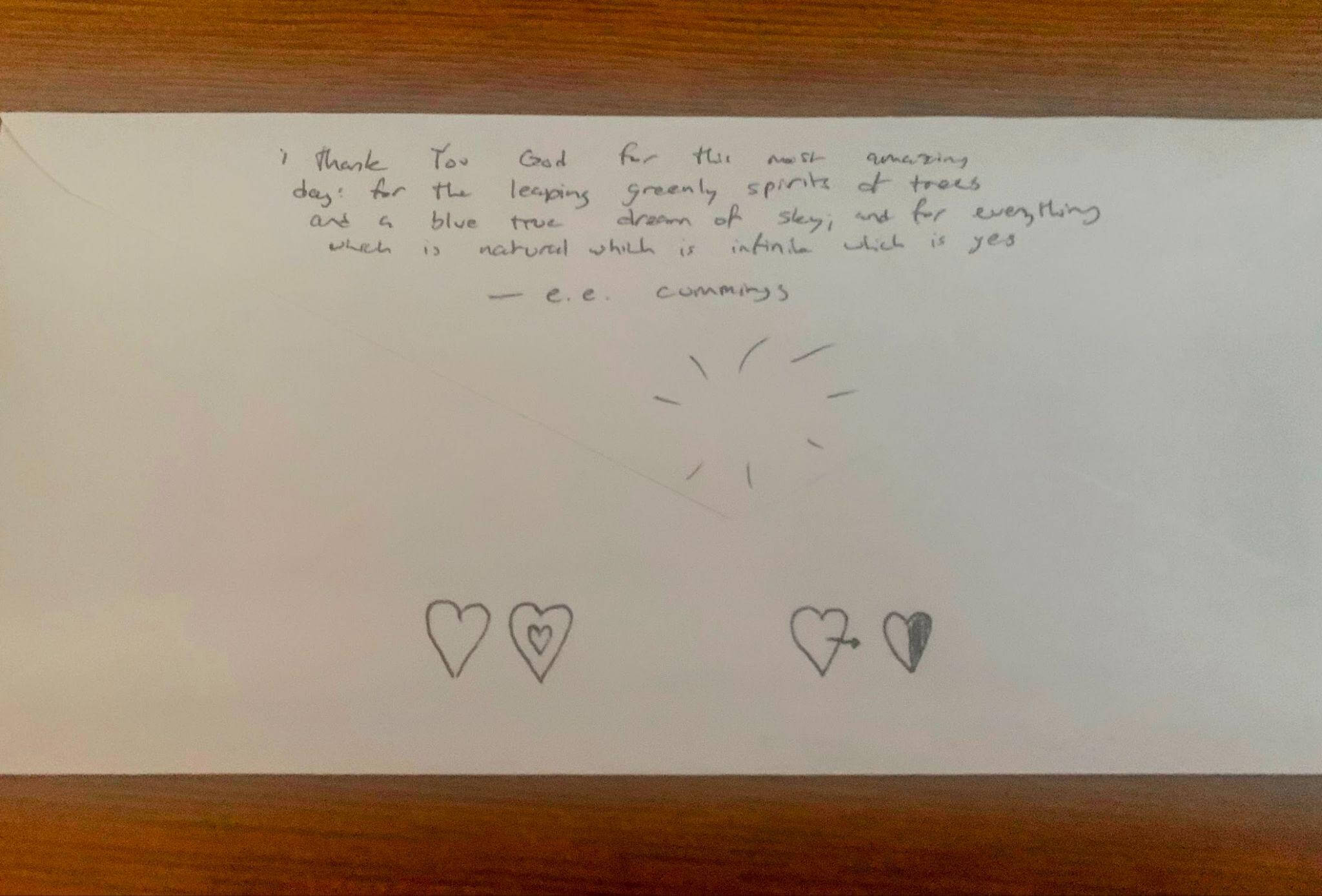
One of my friend Visa’s heroes is Erasmus, the 16th century Dutch humanist, theologian and philosopher. Visa describes Erasmus as “one of the most prolific men of letters in the 1500’s, corresponding with literally hundreds of people,” including Pope Adrian VI, Pope Leo X, Henry VIII. “Why did Erasmus correspond with hundreds of people?” Visa asks. “BECAUSE HE COULD!!!”
Visa describes his goal in life as “being the Erasmus and/or Mersenne of Nerd Twitter, and the broader (Friendly Ambitious) Nerd Internet.”
Erasmus, Mersenne, and Peace Pilgrim didn’t live in the time of the internet, but Visa, U, and I do. The internet makes it possible to correspond with anyone else with a connection—something like two thirds of the planet’s human population.
For me, corresponding through text messages, voice mail, email etc. is load-bearing in my friendships, since I am not based anywhere, and all of my friendships are remote / long-distance most of the time.
Internet friendships are a novel form of connection historically speaking, but they’re very fulfilling for me personally! The friends that I’ve met online are so interesting to learn more about and enjoyable to spend time with! Having continued online contact gives me more context on who someone is and what they care about than I would otherwise be exposed to e.g. if I just met someone at a party or something like that.
It’s also invaluable to me to correspond with people for “professional” reasons, too. My work in the world is intimately connected to having a large social graph and context about what a lot of different people are doing.
The capacity to correspond with friends, acquaintances, collaborators and peers affords all of us tremendous power.
Relationships can grow in depth, meaning, joy, and benefit over years and decades, and correspondence makes it possible to begin, maintain, and deepen a large number of relationships over time.
That said, pretty much everyone I know increasingly has more messages and platforms to keep track of than they feel totally at ease handling. It’s so easy to get overwhelmed, or to miss responding to an important message or an old friend.
Here are some tips that have helped me to keep up correspondences with friends around the world:
- following them on social media, keeping an eye on what they’re up to, engaging with what they post if I want to
- sending a message when I think of them
- sharing tweets or videos or music etc. that I think they’d enjoy
- phone and/or video calls when we both want to (different rhythms for different friendships)
- corresponding about specific topics that I enjoy talking about with them
- collaborating on projects if desired
- seeing them in person when possible
- trusting that established shared context exists even when we aren’t in touch for an extended period of time, and the friendship can be picked up in its own season
Short messages are ok! Like “yes!” or “nope” or “thinking of U!” Or my friend Nvpkp’s “smooch”:
smooch doctrine: sending the word “smooch” to a friend when they come to mind, in order to bypass the hesitation that comes from not having anything to say, really. in the worldview of believing in brotherly love and affection.
It’s also ok to send a late reply… even very late! Like years later! U can just… resume an old correspondence with an old internet friend. I promise Ur friend will be happy to hear from U!
And if U are receiving a late reply from someone—an easy grace goes a long way!
Practically, I really love replying to messages while walking, or in bed after waking up. Find what works for U.
Something about online correspondence that is difficult to intuitively grasp, is that U have the option to be bare-metal synchronous or weeks-late asynchronous in ur messages. U have the power to decide.
Different contexts will call for different speeds and paces. U are dancing with Ur friends and collaborators, learning what rhythm and pace feels mutually good. U can feel out what feels good and safe and connecting in any given relationship or context.
U should never apologize for meeting Ur needs in learning to dance with Ur friends. U can move fluidly between modes as much as U need to. People who love U and truly care about U will be happy to hear from U whenever it feels good for U.
In a collaborative context, it’s helpful to name preferences and mutually agree on, be willing to renegotiate shared expectations (rather than implicitly adopting indirect imposed ones).
Some things can be synchronous, others can be asynchronous—deep connection in any context benefit from both!
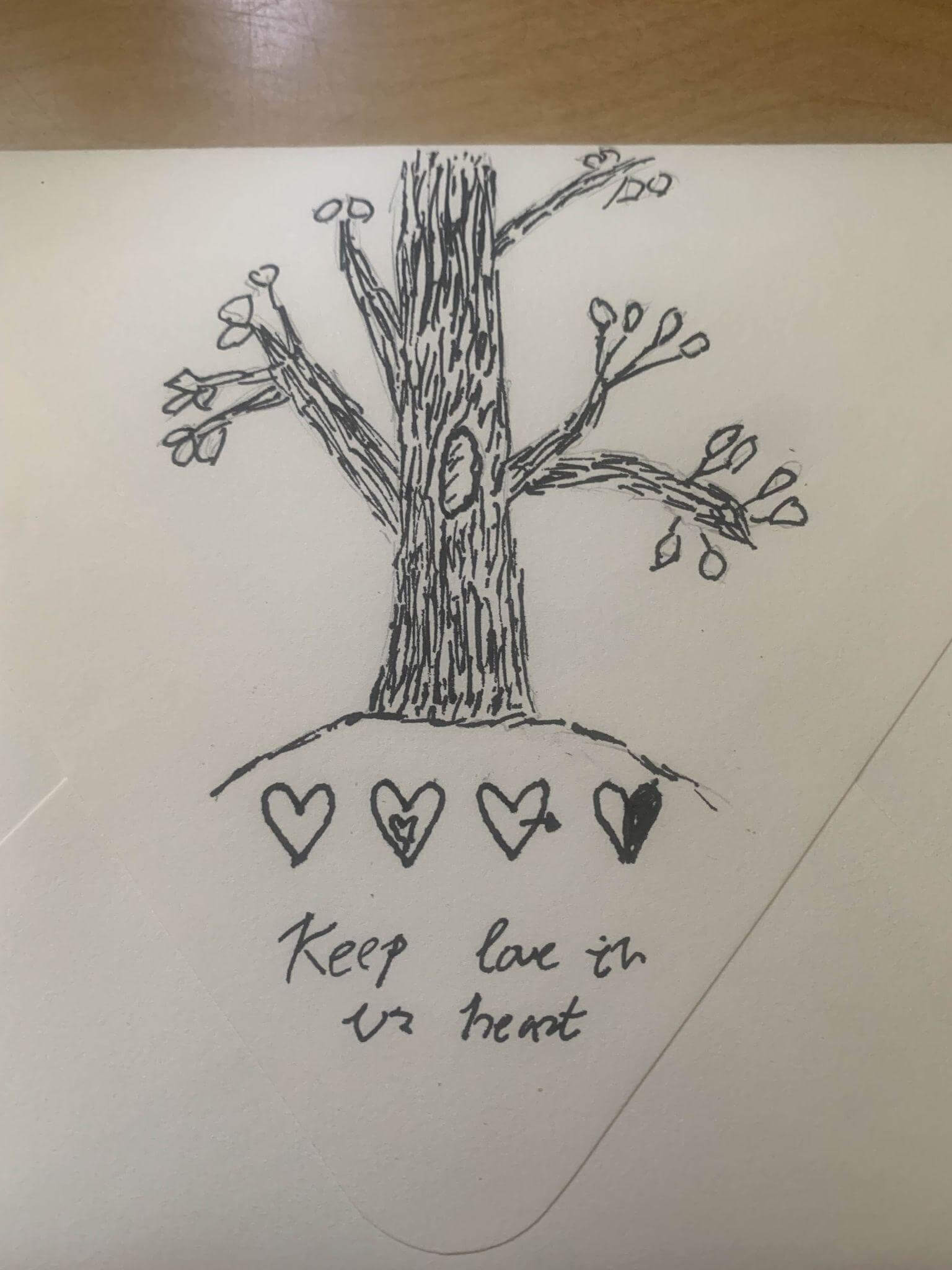
May U enjoy connecting with friends around the world! May Ur correspondences bring U great joy! May they serve Ur curiosity and the world as a whole!
This post is an excerpt of my book, The Path of Curiosity.
20251008 — 100x Scale
if I had 100 or 1,000 times more messages than i do right now, i would start with myself. a journal. a long walk.
i would take time to love myself. ❤️
I would take time to be curious about myself. ❓
i would take time to believe in myself. 🪄
then i would reflect aloud or in writing, in privacy, about who and what were my priorities, what needed my attention most, by my own estimation.
and then i would proceed in order of my own priorities, messaging the people i held most dear first, attending to the most important priorities as i saw fit.
and i would ask for or hire help triaging the messages i had not replied to yet, or couldn’t.
and i would write in public about my experience of messaging, saying for example that i was behind or overwhelmed. (Tyler is good at this.)
and i would make sure to find time to write what needed to be said to many people, and to put it in public, so they might see it, or so I could link to it in individual messages.
self love. strategic thinking. tactical responses.
20250830 Notes
i think, broadly speaking, i have five tiers of communication:
- if u call me on the phone spontaneously, and i am free, i will pick up the phone; if i am busy i will call u back ASAP (what i call a “twelve hour” person)
- i respond to u immediately or within 24h, ASAP
- respond to u within a few days or a week
- i respond to u within a month, when i feel like it
- i do not respond to u
this model is very similar to my friend Forth’s diagram here:
80/20 is going to be installing Beeper as a universal inbox and getting to Inbox Zero
to maintain it U will need the other 80%:
- digital productivity coach for good downstream systems
- short replies sooner (“yes!” “no!” “next week?” “thanks!”)
- perhaps (even) more public resources, blog posts or docs with commonly repeated info
- knowing ur values and priorities (e.g. a message from x more important rn than replying to y)
- good boundaries
- self love, emotions, working with feelings of overwhelm / resentment etc
- from Vika: unsubscribe from every email list you are in and leave group chats.
- rate-limit how often U respond to which people
- can snooze replies for x amount of time
- certainties in life: death, taxes, replies
u never have to reply to anyone. except wife. wife must be replied to
- correspondence is an inevitable part of modern life. doing projects or having relationships of any kind online will involve correspondence
- that said, correspondence can be fun! life-giving, even!
- for me, there are basically three variables i’m considering when deciding when and how to reply: Care, Fun, and Benefit
- Care/Closeness: there are expanding circles of concern from Partner/Best Friends/Guild Members (immediate collaborators)/Friends/Peers/Acquaintances/Strangers. the closer i am to someone, the more I will prioritize replying to them sooner, regardless of content or vibe. I have what I call “12 hour people”- which means that they can call me on the phone, I will pick up immediately if I can, and call them back as soon as possible, within 12 hours. My Dad, my partner, anyone in the Guild, my long term best friends.
- by default, distant acquaintances / strangers get replies on the order of a week to a month, or just as I feel like it. and that’s normal and fine and good!
- Fun: if it’s fun / life-giving to reply, I will prioritize that. that means sometimes I message people back and forth quite a bit! look ma, i’m learning and playing and having fun with my friends!
- conversely, if the prospect of replying is deadening, dreadful, overwhelming, i will reply more slowly, or just very briefly sooner, or not at all.
- Benefit: if I can really help someone by replying to them, if the benefit I can have to them is great, or their need is urgent, or both, then I will prioritize responding to them sooner. U have to trade off against ur life force and ur other logistical constraints, but often we can have a disproportionate positive impact on someone’s life for taking the time to send them a short text message, voice message, or even get on a quick call. I often choose to do so, myself.
- Care/Closeness: there are expanding circles of concern from Partner/Best Friends/Guild Members (immediate collaborators)/Friends/Peers/Acquaintances/Strangers. the closer i am to someone, the more I will prioritize replying to them sooner, regardless of content or vibe. I have what I call “12 hour people”- which means that they can call me on the phone, I will pick up immediately if I can, and call them back as soon as possible, within 12 hours. My Dad, my partner, anyone in the Guild, my long term best friends.
- One thing: people who are emotionally struggling, even to the point of potentially being suicidal (see this note), paradoxically just need human connection. They just need someone to know that they are there. So U don’t have to really respond in detail, in a nuanced and attuned way, to all of their stories and feelings. U can just say something very brief that shows U care about them. 1 short sentence! 1 short sentence once a day or once a week could save a suicidal person’s life, even. and that’s the extreme case.
- if U find urself saying the same things multiple times, take the time to create a resource that U can point people to in the future based on that. tweets, threads, blog posts, videos, online courses, whatever. relatedly, it’s fine to answer someone like “hey, thanks for messaging! i talk about a lot about what U are interested in HERE”
- if it’s not fun, there’s signal in that. make sure to listen to the signal and make a change based on it

